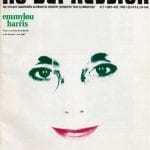Daniel Gore – Mountain music, by the book
Horace Kephart isn’t a household name, but his name is in a lot of households. That’s because of Charles Frazier’s epic 1997 novel Cold Mountain — this year’s National Book Award winner, and the Titanic of literary fiction with 1.5 million copies sold. Look up the acknowledgments page in Cold Mountain, and you’ll find Kephart’s seminal 1913 book Our Southern Highlanders credited as one of the dozen or so sources for the novel’s historical background.
Daniel Gore hopes to put Kephart’s name into a few more households with Ways That Are Dark (Elephant Rock Records). An album of songs based on Our Southern Highlanders, it’s a remarkable piece of bluegrass scholarship that Gore allows “sounds a lot like Cold Mountain feels.”
If there’s a precedent to Ways That Are Dark, it would be Panamanian salsa singer Ruben Blade’s 1987 album Agua De Luna (based on Gabriel Garcia Marquez short stories) or Van Dyke Parks’ Jump!, a 1984 song cycle based on Joel Chandler Harris’ “Uncle Remus” tales. Kephart was a Thoreau-like figure, an accomplished librarian who fled his urban life for North Carolina’s Smoky Mountains at the turn of the century. He went native, and also demonstrated that you can take the man out of the library but not the librarian out of the man.
Kephart spent the rest of his days documenting mountain culture in a series of articles and books, the most enduring of which remains Our Southern Highlanders. When Gore first came across the book 15 years ago, he discovered that it tied together his interests in music, folklore, outdoor pursuits and book collecting.
“I identified something very familiar in Kephart,” Gore says. “It resonated with my own experiences in the Smokies. I’d spent a lot of time up there fishing, hiking, camping….We were always up there exploring somewhere throughout my childhood. Our Southern Highlanders kind of explained things in a way no other book could do.”
Gore started writing songs based on the dialect, tales and events that Kephart recounted. By the time he was ready to record, Gore had moved from his native North Carolina to Spokane, Washington, where he pays the bills as an electrical engineer while playing bluegrass mandolin nights and weekends. For Ways That Are Dark, he recruited an all-star bluegrass cast including Peter Rowan, Tim O’Brien (whose upcoming album, not coincidentally, consists of songs based on Cold Mountain), ex-Red Clay Rambler Jim Watson and Doc Watson sideman Jack Lawrence.
Musically, Ways That Are Dark is first-rate, and the structure makes it a fascinating piece of work. Since many of the lyrics are in archaic mountain dialect, the liner notes include a lexicon of terms: “furriner” (someone from anywhere else), “cooterin'” (to move lazily, like a box turtle), “ol’ Ned” (slang for fat pork) and so forth. The liner notes explain the origins of each song, and also include relevant photographs drawn from the Kephart collection at Western Carolina University.
Topics include feuds, wild pigs, bear hunts and, of course, moonshine. Because moonshine’s production was both illegal and an important part of the mountain region’s economy, clashes between moonshiners and “G-men” federal agents were a fact of life. Close to half the songs on Ways That Are Dark are concerned with one aspect or another of moonshining culture, including the title track (recommended to fans of Steve Earle’s “Copperhead Road”).
“Kephart was very fond of the local water, as they say,” Gore says. “He liked to drink it. But the history and culture of the moonshiner captivated him, too. The process was a lifestyle for these people, their bread and butter. It’s like if you go to Alaska, seal-spearing is part of the culture and nature of the place. Kephart made a point of saying that in the mountains, there was a fine line between G-man and moonshiner. People could easily move from one side to the other.”
Despite its high-caliber cast and impressive quality, Gore was unable to interest any record companies in releasing Ways That Are Dark. In fact, he says he couldn’t even get most of them to return his phone calls (which is not entirely surprising, given that his day job precludes touring to promote an album). So Gore has gone the D.I.Y. route, selling the album by mail order and through a web site.
“In the music business nowadays, if you try to float a project without the inside connections that are required, you’ll never get anywhere,” Gore says. “But that’s okay, and I’m not the only one. More and more great musicians are abandoning their old contracts with record labels and setting up their own companies to market and control their product.”




